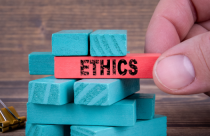The Mystery of Research Paper Retraction

A Contractual Obligation
Even though no money usually changes hands between author and journal in the publication of an academic article or research paper, there is still a legal contract to specify what can and cannot be done with the published work. Some journals limit the sharing of any data pre-publication, and others will apply similar restrictions post-publication.
Under such contractual obligation, there is an expectation of performance on both sides. The author(s) will deliver a piece of work that complies will all relevant rules and regulations and that, it is assumed, has been thoroughly checked and preferably double-checked for accuracy. The journal will then submit the piece of work to an additional peer review to further check the accuracy and suitability of the material for publication in the journal.
When Something Goes Wrong
The Committee on Publication Ethics (COPE) offers detailed guidelines on how and when articles should be retracted, but there is no legal obligation for those guidelines to be followed.
Once a piece of work has been as identified as warranting a full retraction rather than just corrections or further investigation under an “expression of concern,” which is widely regarded as a forewarning of retraction, the button must be pushed and the work either pulled from the online version (with an appropriate notation) or stamped with a watermark of “retracted” on the PDF version.
The Moving Line in the Sand
The consequences of a retraction are bad for all concerned (unless you happen to be on the research team that uncovered the fraud or the flaw in the calculations). The journal has to deal with the embarrassment of having the work get to publication without being caught, and the authors get a stain on their academic references that may never be removed.
For these reasons, there is usually a strong preference not to use the “R” word unless there is absolutely no other obligation, and even at that point, when a formal notification is made, the information provided still remains as vague as possible.
Say Nothing or “No Comment”
The advice given by most media advisers when a negative story breaks concerning their clients can be seen to apply here too. Statements such as: “This manuscript has been withdrawn at the request of the authors,” reveals nothing as to why the manuscript was withdrawn and, if anything casts further aspersions on the authors for their election of such a vague response. Are we to assume that the error was so egregious that it should never see the light of day? Or, are we to take the position offered by Dr. Henry Edmunds, the editor of the Annals of Thoracic Surgery, who, when he was asked for clarification on a retraction, replied: “That’s none of your damn business.”
If every piece of research truly contributes to the existing body of knowledge on a particular subject, then any errors in such contributions should be made known to ensure that no confusion or misinformation is perpetuated by such errors. However, when you consider that it took the British research journal The Lancet almost 12 years to publish a formal retraction of the Wakefield study that fabricated a relationship between the MMR vaccine and autism, you have to wonder if some journals are placing reputation at a higher priority than accuracy.
Given the large amounts of money involved in research these days, the increased propensity for litigation in response to a retraction no doubt influences such decisions very heavily, but the ethical obligation to the wider academic community should never be circumvented by vague and deliberately obscure terminology.









